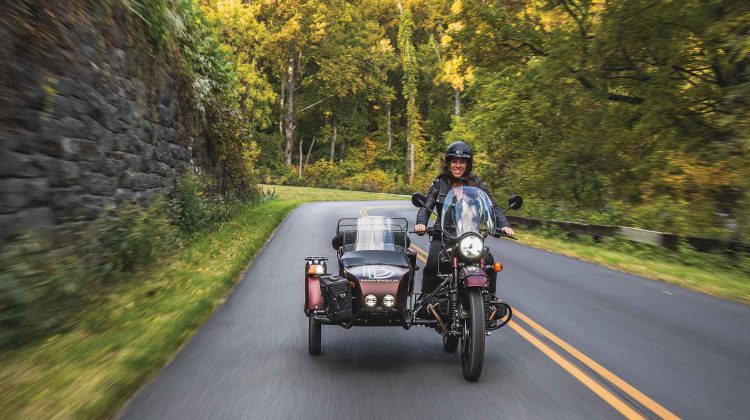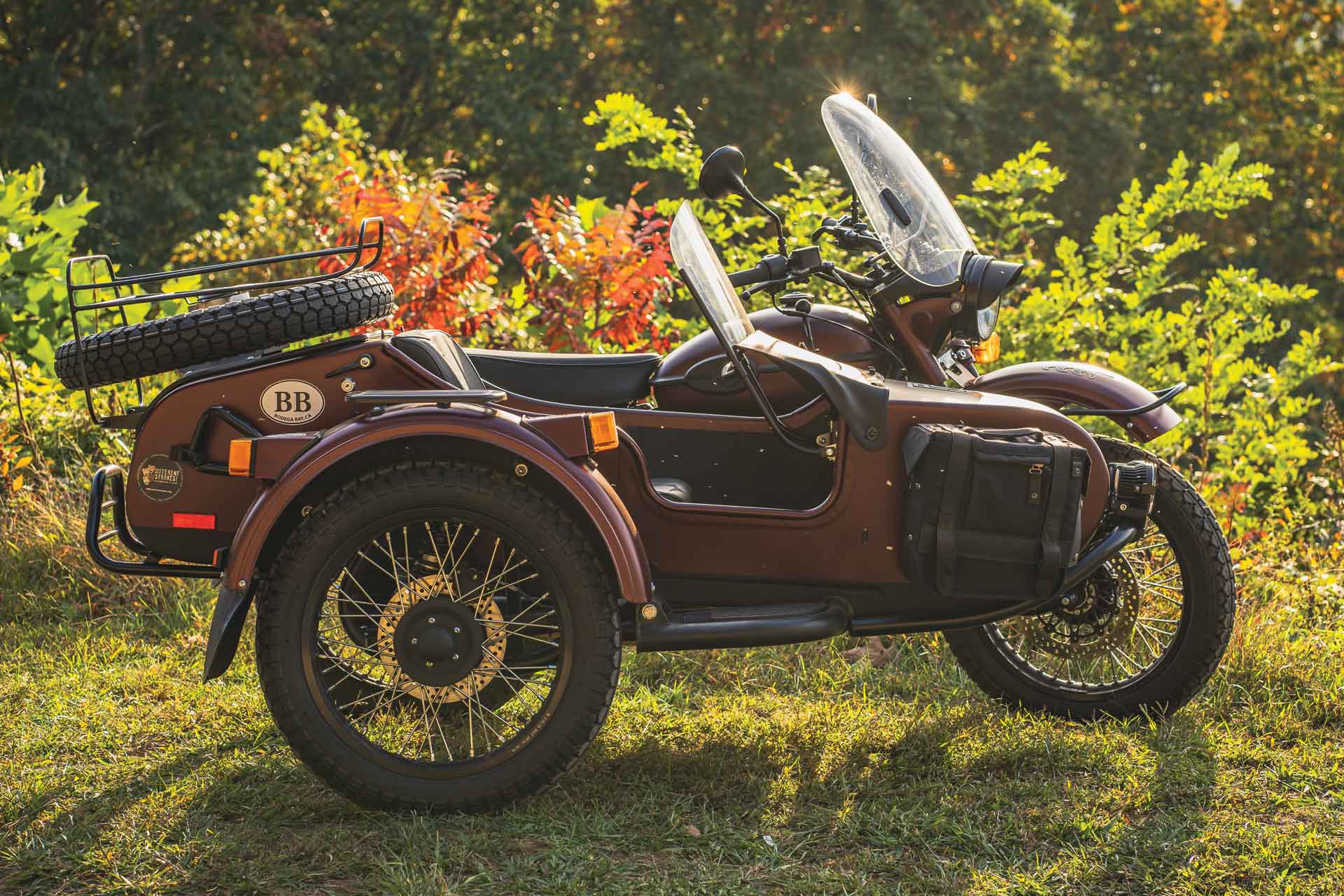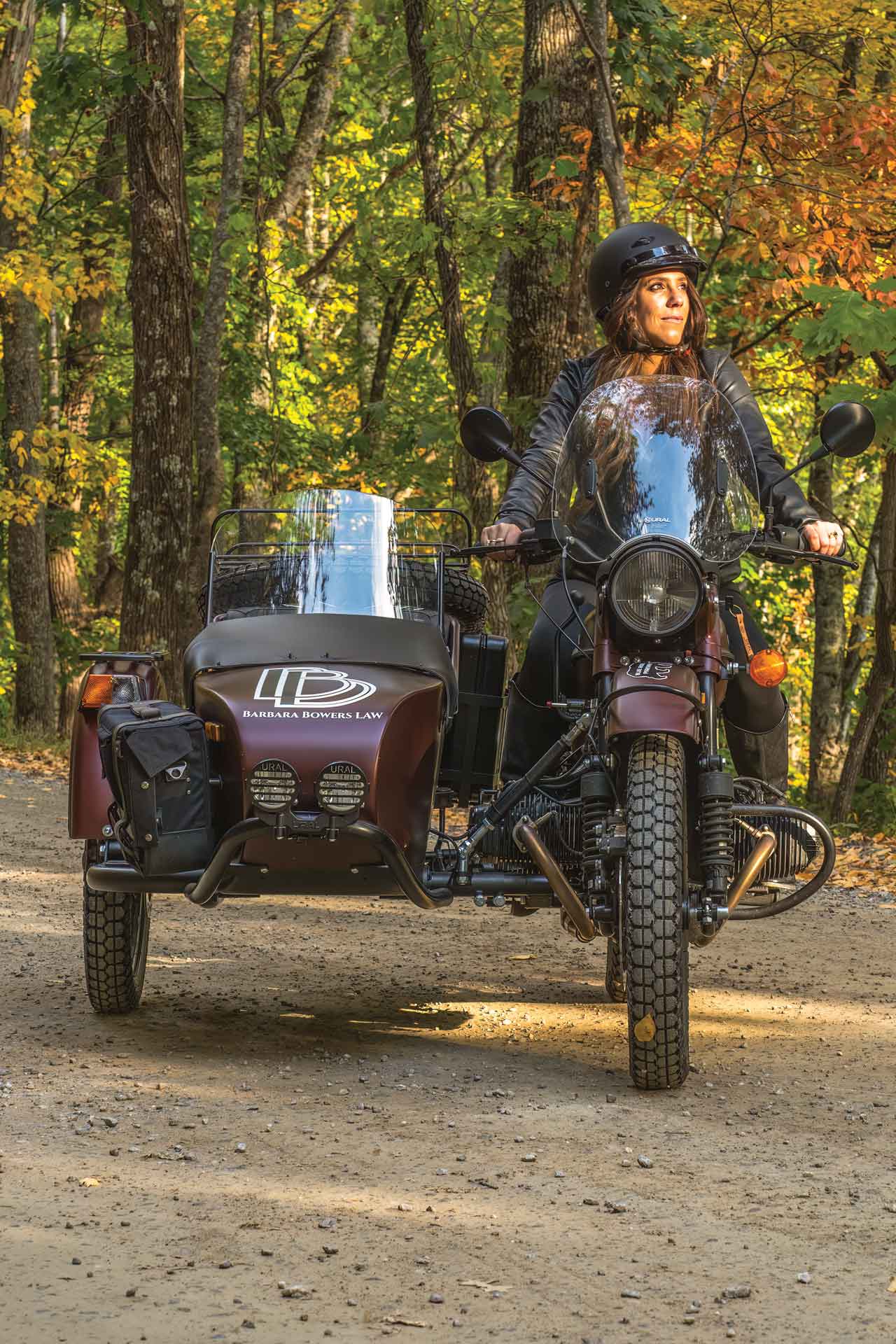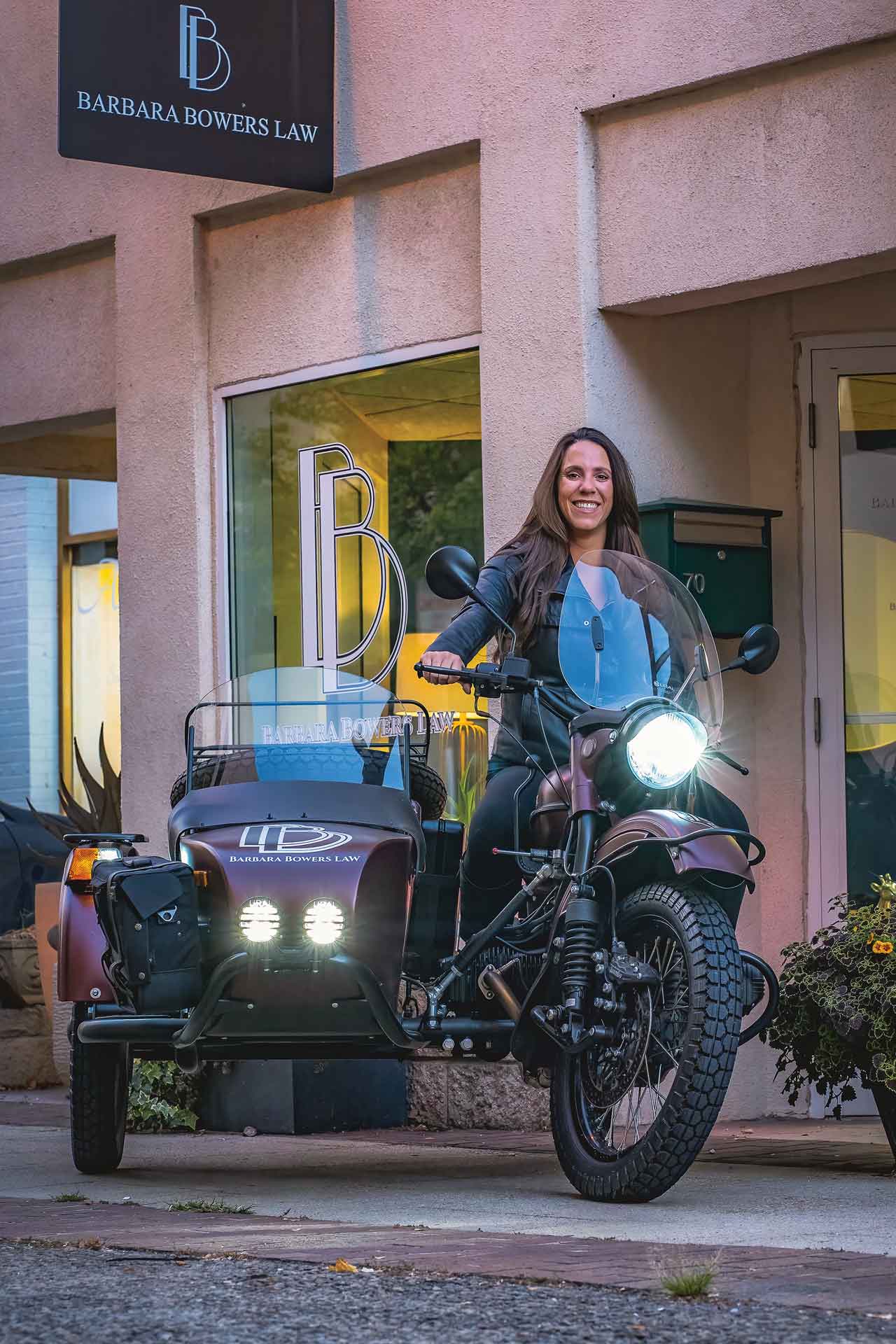
What kind of bike do you ride and how did you choose it?
I always promised my parents I would never get on the back of a motorcycle. Then I met my husband, an avid motorcyclist. It turns out, I don’t belong on the back of a motorcycle, as he tells me I can’t sit still enough. On my birthday a few years ago, he surprised me with a Ural motorcycle. It is a Russian bike [when her husband bought her bike, it was made in Russia. The company, IMZ-Ural, moved to Kazakhstan in 2022 to protest the Russian invasion of Ukraine] with a sidecar.
Did you think about the brand in determining which bike you bought?
My husband chose the Ural because of the sidecar, and it being two-wheel drive. He did his research and learned this was the world’s leading maker of off-road ready sidecar motorcycles, featuring legendary on-demand two-wheel drive.
Is this your dream bike, if not what is your dream bike?
My bike has so much style and people’s faces light up when they see it, and it’s also possible they’re just reacting to the huge grin on my face when I drive it around town. It has a classic old-fashioned look to it even though it is a new bike. I can’t imagine riding anything else, I am so lucky to say I have my dream bike.
What kind of research did you do before purchasing your bike?
Luckily. I didn’t have to do any, since at the time my motorcycle knowledge was limited. My husband did the research and knew this was a great bike to teach me to drive on.

What kind of training did you do before getting your motorcycle license?
I received very strict lessons from my husband, Owen, in a church parking lot. He had the patience to teach me, and I treasure that.
It started with memorizing the parts and elements of the bike, followed by an immediate quiz. It progressed from just learning everything he could teach me about the bike to driving it.
For someone that has never driven a stick shift before, this was a new and exciting experience, but it took some getting used to. I’m proud to say that I rarely stalled the bike. The Ural is very forgiving and user friendly. It took about a month of weekly lessons before I was ready to leave the church parking lot. I stuck to our neighborhood until I gained more confidence, and soon I was out on the roads and loving it!
How old were you when you started riding and how often do you ride?
33. I’ve been riding for three years now. In the warmer months, I ride two-to-three times a week.
Did you grow up longing to ride a motorcycle?
Are you ever told not to do something and then you really want to? Bingo. I did wait until I was an adult with a greater appreciation for the importance of safety and education in riding a motorcycle.
Tell me about yourself, your background, where you from originally?
I grew up in Lodi, California, a small farming community in the San Joaquin Valley well known for their Zinfandel wines. I am the fourth of five children, and I followed in my father’s footsteps to pursue a career in the law.
I got my B.A. in history from the University of California Santa Barbara and went on to law school at McGeorge School of Law in Sacramento. I moved to Asheville in 2015 with my husband where I had the opportunity to open my own practice in 2016.
What type of protective gear do you wear while riding?
I always wear bright-colored clothing and a helmet and goggles, with a pair for night riding as well. I think the Ural gives off a more casual fun vibe as opposed to a faster more competitive bike, and my clothing typically reflects that. I did have a custom leather jacket made with an image of my golden retriever, Theo, on the back dawning his own helmet and goggles.
Do you take passengers for rides?
Originally the goal was for me to take my dog in my sidecar, but he is HUGE, and until I make some modifications, he won’t go for rides. I have had the opportunity to take my mother and my father for a ride in the sidecar. While they both would begin with saying “slow down,” by the end they are having the best time. I enjoy sitting in the sidecar as much as I do driving the Ural. It’s quite the experience, reminiscent of a bobsled or the front car of a roller coaster.

In your experience, how is riding a motorcycle different from driving a car?
This is a great question. First and foremost, it’s so freeing. There is the physical reaction, it’s more demanding than driving a car. You have to utilize your brain and your body, making them work together. In a car you sit there and let muscle memory do a lot of the work. On a bike, you are so much more involved. It’s a physical and mental experience that requires focus and full awareness.
I don’t get endorphins from driving my car very often, but when I drive my Ural, there is definitely an adrenaline rush coupled with a strong focus. There cannot be any distractions, but that is fine with me because it is such a fun experience.
I think everyone should learn to ride a motorcycle. You gain an appreciation for the true meaning behind look twice, save a life. Learning to drive a motorcycle has made me a better driver all together.
What is empowering about riding a motorcycle?
Everything. From the simple knowledge of how to ride a motorcycle, to the act of getting out on the road and going places. The entire experience is empowering, and I think even more so being female.
Riding a motorcycle can be perceived as risky and dangerous. How do you balance this against being a responsible rider?
To me the most important thing about riding a motorcycle is safety. Operating a motorcycle is a privilege, not a right, and an awesome responsibility. You must be prepared for anything when riding, especially when having passengers.
I ride very alert, with a heightened awareness of what is going on around me. You must assume other drivers can’t see you, and often this is true. My father always preached a very well thought out speech to us about risk-versus-benefit analysis. In my opinion, the benefit to riding and the risk can be quite balanced, but with the right mindset and preparedness the benefit can outweigh the risk every time.
Do you think the riding experience is different for women and men?
I think the joy of riding is something the sexes share in equally; however, there is something to be said for being a female involved in an activity that is more commonly male. I think I get to enjoy it even more being female.
What advice would you give other women who have dreamed of becoming a motorcyclist?
Make it a reality, call me, and we can go for a ride. I can only imagine how exhilarating it would be to have an all-female group go riding together. The more I ride the more I love it, and that joy is contagious.
Does riding a motorcycle transform or affect you in other areas of your life?
There are several aspects of riding that has transformed other areas of my life. Primarily, it’s something I can do with my husband, which opens up the literal road for more adventures together. It was something he loved, and I originally feared, and now it’s something we both love.
The responsibility and educational components of riding have also affected other areas of my life and my work. I believe I am a better driver because of it, more alert and aware of my surroundings. Knowing how to ride and what that’s like has given me a foundation for new friendships with other riders I normally wouldn’t have much in common with. In my work, I can relate to my clients who have been involved in accidents, most of whom always get back on the bike, something I admire tremendously.
Tell me about the kind of riding you love most?
From riding to and from my office, to running to the grocery store to long slow rides on the Blue Ridge Parkway, I love them all. There is something about hoping on the bike and riding to do errands in comparison to the same experience in a car, it turns the mundane into a little adventure. Long rides up the parkway to the Pisgah Inn or to go hike Arts Loeb Trail are my favorite.
Have you ever taken a riding trip? What would your dream trip entail?
Not yet! The Ural is equipped with a little shovel, a gas can, a rack and a nice sized storage space, so it is perfect for a long weekend getaway or camping. The best part is it can go off-road, so I really look forward to an off-roading adventure. This year I was fortunate enough to test it out in the snow and it does not disappoint!

How has being a personal injury attorney affected you as a rider?
This is a great question and one I get often. Yes, I see how horrible motorcycle accidents can be, but it is not going to stop me from doing something I love. Awareness is so important, and I have learned that you must ride like you are invisible to others.
I practice extreme defensive riding, and I always assume no one can see me on the road, but I can only do so much, and accidents do happen. Having the knowledge and experience of riding gives me a common ground with my clients. I believe it’s important for a client to have a strong relationship with their attorney, and for their attorney to be able to relate to them and what they are going through. I understand the challenges motorcyclist face on the road, and that understanding gives me the ability to better represent my client.
Are there any precautions you take based on your experience as a professional representing other riders that have had accidents?
I do not have the mindset of “It can’t or won’t happen to me.” I know what is possible and I do not take the responsibility of riding lightly. I do think from my experience as a personal injury attorney who has represented motorcyclists that I have a heightened respect for the importance of being an alert and responsible rider. I also always check my tires, and make sure my bike is in great condition before I ride. On a very practical note, I also encourage riders to have very good insurance coverage because often it can be the case that the at-fault party’s insurance is limited and that once you have exhausted their policy limited, you must then pursue damages for your injuries through your own underinsured motorist coverage.
Is there any advice you can give other motorcyclists that could prepare them should they ever have a motorcycle accident that results in a personal injury?
There are five major Do’s and Don’ts I believe are so important for motorcyclists and motorists alike when they have been involved in an accident:
The 5 DOs:
1. Call the police and get a police report.
2. Leave your vehicle where it is until the police arrive.
3. Take photos of the vehicles and your injuries.
4. Get medical treatment.
5. Call a lawyer BEFORE talking to any insurance companies.
The 5 DON’TS:
1. Don’t wait to talk to a lawyer.
2. Don’t wait to get medical treatment.
3. Don’t talk to the insurance company without representation.
4. Don’t sign anything without speaking to a lawyer first.
5. Don’t stress, your attorney will take care of you.


